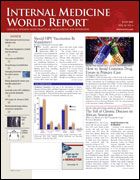Publication
Article
The Case for Drug Therapy in Patients with Prediabetes
Author(s):
FROM THE AMERICAN DIABETES ASSOCIATION
Ronald B. Goldberg, MD
A New Way to Curb the Diabetes Epidemic?
NEW YORK CITY—Since we still do not do a very good job of preventing complications in patients who already have diabetes, we should be focusing on identifying individuals who are in the preclinical phase, when interventions may be able to preserve beta-cell function and slow progression to diabetes, said Ronald B. Goldberg, MD, at a recent conference of the American Diabetes Association (ADA).
IMWR
About 54 million American adults have prediabetes, also known as impaired fasting glucose (IFG) or impaired glucose tolerance (IGT). Each year, about 5% of them will develop diabetes. But only "patients with IGT or IFG who are overweight or obese should be recommended for lifestyle programs targeted at weight reduction through reduced caloric intake and increased physical activity," Dr Goldberg, of the Diabetes Research Institute at the University of Miami in Florida, tells .
The risk of diabetes increases in individuals who also have risk factors for diabetes (eg, family history, obesity, hypertension, gestational diabetes) and varies according to prediabetes type. The annual rate of progression to diabetes with isolated IFG is 17%, with isolated IGT it is somewhat less, and with combined IFG/IGT it is 25%. This is why, as Dr Goldberg points out, "The ADA has recently suggested that the highest-risk prediabetic individuals—those with combined IFG and IGT—be considered for treatment with metformin [Glucophage]."
One of the problems, he says, is that "the line distinguishing when diabetes and its complications begin and where prediabetes ends is rather arbitrary and cumbersome to identify in practice, and many patients with mild hyperglycemia are not recognized as requiring pharmacotherapy until they have been hyperglycemic for relatively long intervals."
Large, randomized, controlled studies have shown that the thiazolidinedione rosiglitazone (Avandia) is comparable to lifestyle interventions in reducing progression to diabetes, while other drugs are much less effective than lifestyle interventions (Table). But new data just released about the potential increased heart attack risk associated with rosiglitazone may override previous evidence on its benefits in early disease.
Table. Interventions for patients with prediabetes, at 3 years
Study (n)
Intervention
Risk reduction vs placebo
DPP (3234)
Lifestyle modification*
Metformin 850 mg bid
Diabetes: ↓58%
Diabetes: ↓31%
DREAM (5269)
Rosiglitazone 8 mg/d
Diabetes or death: ↓60%
STOP-NIDDM (1429)
Acarbose 100 mg 3 times daily
Diabetes: ↓25%
CV events: ↓49%
Hypertension: ↓34%
XENDOS† (3305)
Orlistat 120 mg/d
Diabetes: ↓37%
* Lifestyle modification consisted of a weight-loss diet and exercise program.
† The XENDOS trial lasted 4 years, and orlistat plus lifestyle intervention was compared with lifestyle intervention alone.
DPP = Diabetes Prevention Program; DREAM = Diabetes Reduction Assessment with Ramipril and Rosiglitazone Medication; STOP-NIDDM = Study to Prevent Non-Insulin-Dependent Diabetes Mellitus; XENDOS = Xenical in the Prevention of Diabetes in Obese Subjects.
Key Points
- Approximately 54 million American adults have prediabetes.
- The ADA now recommends that the highest-risk prediabetic persons be considered for treatment with metformin.
- Long-term studies are needed to justify the widespread use of pharmacotherapy in prediabetic patients.
The ADA's recommendation against drug therapy in patients with IFG/IGT is based on the unknowns surrounding its cost-effectiveness, safety, and effects on future cardiovascular (CV) events. In contrast, Dr Goldberg believes that the cost-effectiveness for treating prediabetes has already been established, and at least 1 large study has shown reductions in CV events.
"It is likely as the cut points and targets for treatment of elevated glucose levels are being lowered, and greater emphasis is being placed on early recognition and more effective control of rising glucose levels, that physicians will introduce pharmacotherapy at earlier phases of this disease. Doing so may delay the development of microangiopathy and CV disease," Dr Goldberg says.
He adds, "In the final analysis, long-term outcome studies are the only way to fully justify the wide use of pharmacotherapy in prediabetic individuals or those with mild categorical diabetes. The wider context though is a concern about maintaining the status quo in the face of the deluge of diabetes that is upon us."






